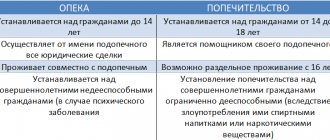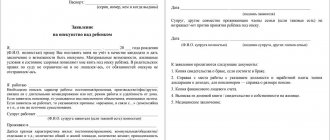How they differ: general concepts
Guardianship and trusteeship are restrictions that can be legally established over a citizen of any age and social status.
This measure is intended to regulate his legal capacity in relation to the actions performed. Guardianship and trusteeship are fundamentally different concepts from the point of view of the law and are expressed in different terminology.
They indicate the form of placement of a child in a family or in a special institution, and also regulate the state support of the ward and the powers of the responsible person acting as a guardian or trustee. A guardian has more rights than a trustee, but also a greater burden of responsibilities.
The legislator considers guardianship or trusteeship as a form of social protection over a person incompetent or in the case where a citizen is partially capable. If a child is under fourteen, the legislator considers him completely incompetent, and only guardianship can be established over him.
Guardianship can also be established over a teenager if he is at an older age: from fourteen to eighteen years old - if there are reasons proving that he is incompetent.
To do this, in a lawsuit, it is enough to provide a document about lifelong disability, in which the ability to self-care is lost, or it may be a mental illness.
Only the legal representative, the guardian, can represent the legal interests or any significant actions of the ward. In other cases, guardianship is established over adolescents in the age range from fourteen years to adulthood or adult but partially incompetent citizens.
All children, healthy or disabled, are subject to guardianship and trusteeship.
A senior citizen can act as a guardian or trustee if he meets all the legal requirements.
Patronage is the concept of providing assistance to a capable person for payment on his part in favor of the patronage body, in contrast to guardianship and trusteeship, where the ward is considered incompetent, and the payment is made by the state in his favor.
The patronage agreement is concluded on a voluntary basis, where the person in need acts as a customer of services and can refuse them at any time.
The patronage agreement is voluntary and can be terminated at any time at the request of the customer. The structure of this type of contract includes services for resolving current personal or everyday issues, asserting one’s rights and fulfilling obligations. As a rule, services of this kind are used by disabled people and elderly citizens.
The direct patronage executor providing assistance does not become an official representative and cannot act on his own behalf without a power of attorney from the customer. Relations between them are of a civil law nature. The patronage assistant does not acquire material rights in relation to the customer of services.
An assistant can be provided by social protection authorities. A social worker as an individual does not have the right to enter into a patronage agreement with a ward. The contract is concluded for a fee with a government agency, with the patronage department.
In adoption, adoptive parents are listed as biological relatives of the adopted child. If desired, the child’s personal data can be changed, and the secrecy of the adoption is maintained.
Upon adoption, an adopted child, along with his own children, has equal rights in inheritance. The adoptive parent does not aim to receive material benefits from the state; he fulfills his civic duty towards the child.
When establishing guardianship, personal data is not modified, and the child can receive information about his biological parents. The guardian cannot dispose of the child’s property at his own discretion, and the child cannot claim as an heir to the guardian’s property.
Dear readers, the information in the article may be out of date, please take advantage of a free consultation by calling: Moscow, St. Petersburg or using the feedback form below.
Guardianship can be assigned to children under 14 years of age and adults with mental illness. The child's guardian supports him with funds allocated by the state, if the child is an orphan, and a survivor's pension. Children whose parents are deprived of their rights to raise them receive additional alimony, which is also spent on their maintenance.
The state also allocates funds for maintenance and pays pensions to disabled children. All benefits are transferred to the accounts of the guardian, who is obliged to spend them on the upbringing, treatment, education and development of children taken under guardianship. The guardian may dispose of property only with the permission of the guardianship authorities. His duty is to preserve the property of the ward without causing damage to it or reducing it.
The guardian is obliged to support an adult ward on a disability pension and benefits provided by the state for such cases.
The guardian is the legal representative of the ward in all instances, including the court. All necessary transactions are carried out by the guardian in the interests of the wards and on their behalf.
Guardianship is assigned to adolescents from 14 to 18 years of age, as well as adults who are considered partially capable (alcoholics, drug addicts). The activity of the trustee is to control the actions of the wards, their property and funds. The trustee agrees to carry out small transactions if they do not contradict the interests of the child or adult under guardianship. He can also protect the interests of the ward where necessary, but not for him, but with him.
For example, a trustee can control the teenager’s behavior, monitor how and where he spends the scholarship, see the teenager if he is detained on suspicion of committing a crime, act on the defense side, get acquainted with the case, etc., then is to provide assistance to the child and protect his interests together with him.
A trustee can also be appointed to a legally capable person who is of sound mind, but is paralyzed or has poor mobility, at his request. In this case, the trustee carries out all actions under the power of attorney of the person under his care.
In the life of an adult and a child, different situations occur that can put the family in a difficult situation: material, financial, psychological and social. Such circumstances may include:
- death of parents;
- their evasion from fulfilling parental responsibilities;
- serving sentences in prisons and camps;
- deprivation or restriction of parental rights by a court decision;
- recognition of a parent as incompetent by a court decision;
- being under compulsory treatment.
In these cases, the child is left without parental care and may be placed in an organization for orphans (“orphanage” and children without parental care for the purpose of further life arrangement. If there are relatives who are ready to take the child under guardianship or trusteeship, priority is given the blood family and relatives of the minor are asked to collect a package of documents to establish guardianship.
There is another form of placing a child in a family, called adoption.
It can be established if a married couple wants to foster a child in order to give him the status of a son or daughter. Another factor is, for example, the following situation: there is a family where there is a child from the mother’s first marriage, and the current husband has a desire to give him his last name, to become a united family, to be a father.
We suggest you read: Does a guardian have the right to work?
Adoption presupposes a completely different form of placement of a child in a family, different from guardianship, their difference in goals, package of documents, mechanism for giving status to the child. It is not aimed at the temporary education of a minor under 18 years of age, but at his permanent residence in the family.
You can adopt a child through court proceedings if he has the status of an orphan, or his parents have abandoned him, or he is being raised by one of the parents, and the second legal representative is absent, which is confirmed by a certificate from the registry office of form No. 25 (about birth).
Adoption has its advantages:
- the child, in accordance with the law, is the son or daughter of the adoptive parents;
- legal representatives are obliged to ensure and protect by all reasonable means the rights and interests of this minor;
- being raised in a family where he is wanted, will feel loved, supported and cared for.
Minuses
A relative disadvantage can be considered the lack of government funding, since the child is a son or daughter, which means that the parents are responsible for providing for his needs on their own.
A person who decides to take guardianship or adopt a child asks the question: what is the difference between guardianship and adoption?
The difference between guardianship and adoption is global; these are 2 completely different forms of placing children in families. They have the following differences:
- adoption differs from guardianship in its purpose - guardianship or a foster family may involve raising a child up to 18 years of age, and adoption is confirmed by the status of a son or daughter;
- the guardian provides for the needs of the child, relying on financial support from the state, and the adoptive parent acts independently in this regard;
- guardianship is formalized in the department of guardianship and trusteeship, and adoption is established in court;
- guardianship and guardianship are monitored by specialists from the guardianship and guardianship department until the child reaches 18 years of age by checking the living conditions of the wards; adopted children are checked only during the first three years after the trial.
What is better is guardianship or adoption, only the future parents themselves can decide, since the preparation of documents depends on the goals of the candidates, for what period they are ready and able to raise a child. The difference between them can also be seen in legislative aspects. The mechanism for establishing guardianship is regulated by the Federal Law “On Guardianship and Trusteeship”, and the adoption process is regulated by the Family Code of the Russian Federation.
Over the child According to the law, a guardian or trustee may be appointed to a minor child in the following situations:
- at the initiative of parents due to the inability to temporarily fulfill their parental responsibilities for a valid reason or health condition;
- in case of deprivation of parental rights or their evasion from fulfilling the responsibilities of raising a child;
- in case of death of parents or absence unknown;
- due to parental incapacity;
- in situations where the actions of parents towards children interfere with upbringing, violate the law or contradict moral standards.
Main differences
Guardianship can be assigned to minors under 14 years of age and adults who have serious mental pathologies. Guardians of children support them with funds that the state allocates if the person is orphaned, and a pension if the breadwinner dies. Persons whose parents have been deprived of their rights or whose upbringing has been limited receive monthly funds spent for maintenance.
Disabled children receive financial assistance and pension payments from the state. This money is transferred to the guardian, who is obliged to spend it on the interests of the person who has been taken under guardianship. The guardian spends and uses the property with the permission of special authorities. Responsibilities include preserving the ward’s property without causing damage.
The adult ward is supported by the guardian on a disability pension and benefits provided by law for certain cases. The guardian is appointed as the legal representative of the ward in each of the authorities, including the court. Each necessary transaction is carried out by the guardianship taking into account the interests of the ward and only on his behalf.
A guardian is appointed for a teenager from 14 to 18 years old, as well as an adult who is designated by the court as partially competent (with addictions). The actions of trustees are to control the actions of the ward, his property and funds. The trustee gives consent to small transactions if they do not go against the interests of the children or adults under guardianship. They also protect the rights of the wards where necessary, but not entirely for him, but with his participation.
A guardian may also be appointed to a legally competent person who is sane but paralyzed or has poor mobility, with his or her agreement. In this case, each action of the trustee is carried out by the power of attorney of the ward.
According to the Federal Law “On Guardianship and Trusteeship”, guardians and trustees are not paid for their work; they can use some benefits and compensation. But in certain cases and in protecting the rights of children, guardianship authorities may conclude agreements on the payment of benefits.
Funds for benefits are allocated from funds from the property of the wards, fund services or from the regional budget. The size of benefits is established by the Government of the Russian Federation. Cases and methods of payment of these benefits are decided by local authorities.
Real estate is not provided to a guardian or trustee for the purpose of guardianship. Guardians and trustees must live with their wards in their own apartment. Only if:
- he lives in another district or city, in an inconvenient area from the ward;
- the living conditions of the guardians do not meet the requirements of the guardianship authorities;
- persons under guardianship are themselves interested in living in their own home,
guardians or trustees use the real estate of an individual for the duration of their duties. It is most often used in practice when a person is placed under the guardianship of direct relatives.
The document may be challenged by interested parties. Required documents To register guardianship, you will need the following documents:
- identification document;
- application for appointment as guardian;
- salary certificate for the last year;
- a document confirming ownership or right to use residential premises (for example, a social tenancy agreement);
- certificate of no criminal record;
- medical certificate confirming the absence of contraindications for the exercise of guardianship duties;
- document on the conclusion of a marriage union;
- consent of family members to guardianship;
- autobiographical information about the applicant;
- pension certificate;
- characteristics from the place of work.
We invite you to read: Guardianship of a guardian of an incapacitated person - advice from lawyers and lawyers
Papers are submitted in originals and copies. The decision is communicated in writing.
It is worth understanding the difference between guardianship and trusteeship. So what is guardianship?
In turn, guardianship is the same actions aimed at raising children, but the age of the children is from 14 to 18 years. This is the main difference, but there are also a number of statutory amendments under which a guardian and a trustee have slightly different rights.
A guardian in relation to a minor has the opportunity to:
- make legal transactions;
- go to court if the rights of the ward have been violated or transactions have been made not in the interests of the ward, but for the selfish purposes of third parties;
- The guardian is responsible for damage caused by the child.
The list is not closed; the legislator provides for a number of other actions that the guardian has the right to perform on behalf of the ward.
The trustee, in turn, has the right:
- On behalf of the ward, demand the collection of debt from another person.
- If necessary, file a lawsuit to invalidate the transaction made by his pupil.
- To give or not to give consent for the ward to carry out transactions, except those that he has the right to carry out independently and without the permission of the trustee.
Upon reaching the age of majority, the child no longer needs guardianship if recognized by the court as competent.
Help for guardians and trustees
In accordance with the Federal Law “On Guardianship and Trusteeship”, the work of a guardian and trustee is not paid; he can enjoy some benefits and compensation. However, in individual cases and in the interests of the child, the guardianship authorities may enter into an agreement on the payment of benefits to him. Funds for benefits can be allocated from income from the ward’s property, assistance funds, or from the regional budget. The size of the benefit is established by the Government of the Russian Federation. In what cases and how to pay such benefits is decided by local authorities.
Sometimes, at the request of the guardian, the guardianship authorities allow the use of the ward's property for personal interests. In this case, an agreement must be concluded, which specifies exactly what the guardian can use, for how long and under what conditions.
Apartments are not provided to guardians and trustees for their activities. A guardian or trustee must live with the ward in his own living space. But if
- he lives far from where the child or mentally ill adult lives;
- the guardian’s housing does not meet the requirements of the guardianship authorities;
- it is in the interests of those under guardianship to remain living in their own house or apartment,
then, again on a contractual basis, the guardian or trustee uses the living space of the ward during the performance of his duties. This is especially often practiced when relatives take custody of the child.
What is the difference between a guardian and a trustee? Only in relationships with the student.
Otherwise, for both, it is daily work, noble and grateful, to help children and adults who are helpless in front of the realities of life and in need of protection.
Functions of bodies protecting the rights of citizens who cannot fulfill their civil duties
- Identification of persons in need of guardianship and trusteeship.
- Patronage of capable citizens.
- Appeal to the justice authorities to declare a person incompetent or, conversely, to restore his legal capacity.
- Maintaining strict control over the work of guardians assigned to incapacitated citizens.
- Carrying out close monitoring of the activities of institutions where persons with limited legal capacity or incapacity were placed.
- Establishing patronage over capable citizens who are unable to independently cope with their responsibilities. It is concluded on the basis of an agency agreement or an agreement for the management of a person’s property.
- Identification of violations in the activities of assistants or guardians and subsequent removal of them from their duties.
- Searching for new trustees or guardians to replace those who voluntarily refused to further work with their wards.
- Providing permission for transactions of guardians or assistants with the property of their guardians or wards. For example, alienation of property in which family members of a ward citizen live.
- Representation of the interests of citizens in the justice authorities in relation to both any third parties and their guardians and trustees who incompletely or did not properly represent their interests.
- If a person under guardianship or patronage moves to a new place of residence, then local authorities transmit all the necessary information to those authorities that will now deal with this citizen.
- Consideration of citizens' appeals and preparation of responses to them.
- Control over the actions of the assistant exercising patronage over capable citizens, and reporting to the ward about his unlawful actions.
- Acting as legal representatives for incapacitated citizens (if there are no relatives) when applying compulsory medical measures established by the court.
Differences between guardianship and trusteeship and patronage
- minor children;
- pensioners;
- disabled people of the first, second or third group;
- citizens who have mental disorders and require constant care.
When registering guardianship over a disabled person, the disability group is taken into account. The guardian can be permanent, living together, or a foster carer who visits regularly. A patronage guardian is appointed if the citizen in need of help and supervision is competent and does not have mental illness. Such a guardian solves everyday problems and makes small transactions in the interests of the disabled person.
If a disabled person is recognized by a court as mentally ill and incompetent, then in this case the guardianship and trusteeship authorities appoint a permanent guardian after the entry of a court decision recognizing the disabled person’s incompetence.
The guardian takes full responsibility not only for caring for the disabled person, but also manages his finances. Once a year, a report is submitted on how the funds belonging to the disabled person were spent.
When receiving monetary compensation from the child’s parents, the guardian does not have the right to spend the funds received for his own purposes. A special agreement is drawn up between the parents and the guardian, which states that the guardian is responsible to the child’s parents for the quality of the child’s living conditions and health.
There are other reasons why a child is placed in the care of other people while his parents are alive:
- if parents have alcohol or drug addiction;
- if the natural parents are unable to financially provide decent upbringing and living;
- if the parents have any mental illness;
- on regular business trips or working in another city.
What is the difference between guardianship and guardianship of adults?
Guardians are citizens who have been declared legally incompetent by a court decision.
Guardians are citizens who have reached the age of majority and have legal capacity. They are appointed by authorities dealing with issues in the field of guardianship and trusteeship to resolve the life issues of incapacitated wards and for guardians to act on their behalf in resolving legal issues.
Adults with legal capacity are under guardianship. They are patronized by their assistants (trustees). People under patronage, due to their state of health or age, cannot perform all their duties
Rights and responsibilities of guardians
Guardianship rights and responsibilities include: the duty to provide care to the ward by creating the necessary living conditions, providing him with medical care, education, training and development.
The guardian has the right to demand the return of the ward from citizens holding him in captivity contrary to the law. Guardians are obliged to take measures to protect the civil rights and interests of the ward. Guardians of individuals whose civil capacity has been limited are obliged to help provide treatment and create the necessary living conditions.
Trustees must: take care of creating the necessary living conditions, education, training and development, give an agreement for the wards to formalize legal actions in accordance with civil law. Trustees are obliged to take measures regarding the interests of the person under trusteeship.
The legislation stipulates that the supervisory authorities regarding the conditions of maintenance, upbringing and education of children over whom guardianship or guardianship is established are guardianship and trusteeship authorities. These include the executive committees of district, city district, city, rural and town Councils of People's Deputies.
If, after passing the examination, the restriction of parental care is confirmed, the guardianship and trusteeship authorities undertake to place the children temporarily in one of the specialized institutions (orphanages, boarding schools, etc.) or transfer them to citizens who will take the person into care until the issues are resolved to establish guardianship or trusteeship over him.
Responsibilities of a guardian:
- keep the disabled person clean, prepare food for him, buy food;
- buy necessary medications, transport to health treatments and medical examinations;
- protect his rights and ensure that he does not become a victim of the selfish goals of third parties.
The guardian must fulfill his duties impeccably.
Guardian rights:
- the guardian has the opportunity to live with the disabled person in his living space in order to ensure proper supervision;
- receiving cash payments from the regional budget;
- has the right to receive as a gift residential premises that belonged to a disabled person with the consent of the latter after his death.
We invite you to familiarize yourself with: Documents required to apply for a mortgage deduction for an apartment
If a disabled person is constantly in a psychiatric institution, then guardianship is assigned to the hospital.
General information
According to the generally accepted formulation, guardianship is a special type of family legal relationship, entailing a number of responsibilities on the part of the guardian regarding the adopted persons for the proper care and upbringing of these persons. It should be clarified that guardianship is appointed only by a special body - the guardianship and trusteeship department. No citizen has the competence to independently declare himself a guardian. This circumstance must necessarily be agreed upon with the above-mentioned public service.
The law determines that guardianship is appointed only over minor citizens who have not yet turned 14 years old, or over another special category - incapacitated persons. In this case, the age of the incompetent does not matter. The difference between guardianship and trusteeship is that the latter deal with the legal relationship of free care for minor citizens over 14 years of age, as well as for persons with the status of limited legal capacity.
What is guardianship and trusteeship?
First, let's note that there are some differences between guardians and trustees.
- They talk about guardianship when it comes to children under 14 years of age or completely incompetent adults, who also need to be looked after like little ones.
- Guardianship can be established, for example, over teenagers 14-18 years old, or over adults who are capable, but who need to be controlled in order to avoid trouble (for example, drug addicts). The trustee controls the transactions made by the ward.
Next we will talk more about guardianship, since our article is about children.
The main priority in raising any child is the family, whose members will support in difficult times and provide assistance in difficult situations. The correct formation of a person’s personality occurs only in this form of education.
The concept of guardianship presupposes the life arrangement of children left without proper parental care from their relatives or citizens who want to take custody of a child, but have previously undergone specialized training.
When a child reaches 14 years of age, his legal representative becomes a guardian.
The staff of the institution that supervises guardians and trustees also includes citizens who are involved in raising children professionally; they are called foster parents. As a rule, they practice recruiting several children into their family, often becoming mothers and fathers for them, and after 18 years of age, they release them into adult, independent life. An agreement on foster family is concluded between them and the social welfare institution, within the framework of which they have their rights and obligations.
A child raised in a foster or guardianship family may receive a monthly maintenance allowance.
It is required if the minor has orphan status, or the parents are under compulsory treatment, are registered with a narcologist, are serving a sentence, or have been deprived or limited in parental rights. If parents evade their responsibilities, such benefits are not assigned.
The advantages of establishing guardianship compared to keeping a child in a state institution include:
- raising a child in a family with instilling in him the necessary social norms and values, the correct formation of personality;
- protection of his property and financial rights;
- control over training, health and life protection;
- successful adaptation in society.
Flaws
Guardianship has only one drawback - if during the stay in the family, the guardian improperly fulfilled his duties, then the child may remain unprotected financially and property-wise after reaching adulthood. In addition, cases of domestic abuse are quite rare, but sometimes occur.
Minuses
Requirements for candidacy by guardianship and trusteeship authorities
In order to become an adoptive parent for a child who is no longer being raised in the family of his natural mother and father, he must undergo a number of checks from the guardianship and trusteeship authorities. Often, the closest relatives most often apply for the role of guardian: grandparents, aunts or uncles, older adult brothers or sisters. But it also happens differently, a stranger becomes a trustee who decides to give the child a home and love.
- In order to give a child a home, love and care, it is not enough to just want it, it is necessary to meet the following requirements from the guardianship and trusteeship authorities:
- Be a legally competent adult citizen of the Russian Federation.
- Have permanent employment and a stable income.
- Have not previously been deprived of parental rights. The statute of limitations does not matter.
- Approach moral education, be responsible and reliable for your ward.
- The guardian must himself express a desire to take responsibility for raising a particular child.
- If you have a criminal record, it must be expunged at the time of application to become a guardian.
- Do not have alcohol or drug addiction.
In order to be able to apply for the role of a guardian or trustee, you must provide the following documents to the relevant authorities:
- Candidate Statement;
- An autobiography is compiled, which briefly indicates the last name, first name and patronymic, nationality, date of birth, residential address, education, place of birth, place of work and marital status.
- A certificate of employment for the last year or a declaration of income is provided.
- Confirming document about the availability of living space. This may be a certificate of home ownership or an extract from the house register.
- If there is a spouse, marriage registration certificate and his/her written consent to adoption.
- A state-issued conclusion from a medical institution on health status.
- In some cases, you may need a reference from your place of work drawn up in a special form.
- Certificate of no criminal record.
- Copy and original passport.
For convenience, you need to make an additional package of documents, which will contain copies of the submitted papers.
The application requires the following information:
- from whom the application was made;
- to which organ and to whom;
- passport series and number;
- candidate's residential address;
- drawn up with a request to appoint a specific child as a guardian;
- the place of work and a brief description of job responsibilities are indicated;
- who lives together;
- what kind of relationship does the future guardian have with the prospective pupil;
- The date of drawing up the application and the personal signature of the candidate are indicated.
What do guardianship and guardianship have in common?
Guardianship and trusteeship have many differences, but they also have a lot in common.
Requirements for candidates
The requirements for candidates for guardians and trustees are the same. Both should:
- be fully capable adult citizens of the Russian Federation;
- have no criminal record;
- do not have any illnesses that interfere with the performance of the duties of a guardian;
- have not previously been deprived of parental rights;
- not have been previously removed from the duties of a guardian or trustee due to the fault of the candidate;
- have a permanent place of residence.
Appointment procedure
In accordance with Art. 11 Federal Law No. 48 of April 24, 2008, the procedure for appointing guardianship or trusteeship consists of the following actions of the candidate:
- submission by the applicant of a petition for the decision of the PLO to appoint him as a candidate for guardian or trustee;
- collection and transfer of necessary documents to the PLO;
- consideration of the application from the submitted documents by specialists of the guardianship department;
- training courses for guardians;
- receiving a certificate stating that the applicant has completed training;
- inspection by PLO employees of the living conditions of a candidate for guardian or trustee;
- obtaining a conclusion that the applicant has the right to become a guardian or trustee;
- issuing an order to appoint guardianship (trusteeship);
- conclusion between the guardianship authorities and the candidate of an agreement on paid (gratuitous) guardianship (trusteeship).
Benefits for guardians
Guardians and trustees, being responsible for the fate of another person, have some benefits that the state provides them.
If we are talking about children, you can count on the following benefits:
- a guardian or trustee may work part-time, while wages are paid based on hours worked;
- When raising a child under 5 years of age, the guardian may not work night shifts, go to work on weekends and holidays, and refuse business trips. If the guardian himself does not express a desire, then in this case a special document is drawn up in which the consent of the guardian is recorded;
- if there is a child under 1.5 years of age in care, then the guardian has the right to raise the child and stay at home, while receiving 40% of his salary;
- You also have the right to extraordinary leave at your own expense, not exceeding 14 days.
The state, taking care of the pupils and caregivers, allocates some financial assistance from the budget to such families. Payments are made not from the federal budget, but from the regional one, so payment amounts may vary significantly depending on the region of the country.







